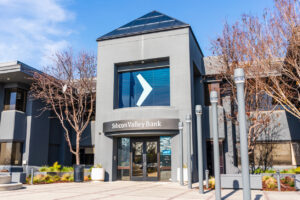Salal Credit Union serves a diverse base of businesses and individuals, and we’re always working in the interests of our members, not profit-driven stockholders.
Russell Rosendal
The collapse of Silicon Valley Bank in March of 2023 was the second-largest bank failure in U.S. history after Washington Mutual’s in 2008. While the issues that caused the Silicon Valley Bank meltdown were largely tied to internal mismanagement, there were lessons to be learned for businesses and consumers alike. The scenario was complex, but at its core there are several specific reasons why this happened. A lack of federal supervision also allowed the problems the bank faced to grow, and ultimately led to its collapse. Thankfully, at Salal, we have very different operating structures that protect us—and our members—from the type of situation that befell Silicon Valley Bank.
 Concentration of Deposits: A Risky Proposition
Concentration of Deposits: A Risky Proposition
One of the factors that led to Silicon Valley Bank’s downfall was its extreme concentration of deposits—totaling billions of dollars—within a relatively small number (several hundred) of accounts. Most of the account holders were tech startups or other tech-centric companies, and when interest rates began to rise, the majority of those companies started to struggle to get additional financing from venture capital and other sources. They suddenly needed to draw on the deposits they had at Silicon Valley Bank.
The lack of diversification of deposits created chaos when withdrawal requests began to snowball, and Silicon Valley Bank didn’t have the cash on hand. It had been invested in low-yield treasury bonds and held-to-maturity securities. In order to get the money back, the bank had to sell the securities quickly and at a substantial loss. The withdrawals had accelerated because of a capital raise related to sales of those held-to-maturity securities for losses, and the bank’s management failed to adequately communicate the reasons for the transactions.
The timing couldn’t have been worse for Silicon Valley Bank: The value of those previously issued bonds had fallen drastically because they were locked in at a lower interest rate before the Fed had raised interest rates on comparable bonds amid spiraling inflation.
At Salal, our deposit base is far more diverse. While many credit unions have historically been chartered to serve a single employer or a narrow segment of the population, we take a different approach. We serve a diverse range of consumer and business members representing healthcare, clean energy, retail, and many other sectors.
With 60% of our deposits originating from these members, our funding structure deviates from many regional commercial banks, and the extreme seen at Silicon Valley Bank. We also have long standing lines of credit with the Federal Reserve in case of emergency situations. That factor mitigates the risk associated with deposits and ensures we have funding sources in place that can effectively handle any significant outflows. Silicon Valley Bank had some, but not enough.
Member-Centric Operating Structure
Salal Credit Union’s operating structure is also very different from Silicon Valley Bank’s, which was a publicly traded company guided by stockholders’ interests in driving profits. At Salal, we operate with a clear focus on the financial well-being of our members. This fundamental difference shapes our decision-making processes, leading to more conservative and risk-averse practices and a foundation based on long-term sustainability. And in order to maintain long-term sustainability, we do not react to minor changes in financial markets.
Our primary goal is to grow Salal for the benefit of our members. Unlike many banks, whose primary responsibility is to serve the interests of profit-minded stockholders, we are guided by the needs and priorities of our members.
Building Strong Relationships: A Foundation of Trust
Another element that sets Salal apart is the strong relationships we have cultivated with our member businesses. Since 2014, we have been at the forefront of banking in the cannabis industry. Over the years, we have developed long-term relationships and earned the trust of our cannabis business partners.
As Washington State and Colorado moved forward with their historic cannabis legalization, we knew banking would be a big issue for businesses with federal illegality looming over the brand-new industry. That’s why we approached the Washington State Department of Financial Institutions in early 2014 to figure out a path forward after the U.S. Department of Justice issued the Cole Memo to address state-regulated cannabis programs. Collaboratively, we crafted procedures for monitoring financial transactions and other requirements to avoid unnecessary federal interference. This collaborative relationship with regulatory bodies has been instrumental in our success in providing cannabis banking solutions for businesses and industry employees.
Our ongoing relationships with regulatory officials have played a crucial role in our credibility. For many years, we have worked hand-in-hand with financial examiners, ensuring the transparency and open communication critical to a solid financial foundation. What truly sets us apart is our commitment to pushing for progress, such as digital payment processing through the CanPay debit solution and the POSaBIT payment platform for retailers. We’re transparent with regulators, and like to think of Salal as a bridge linking them with cannabis businesses. Risk analysis is always at the forefront of our efforts, with a priority on protecting the National Credit Union Administration insurance fund and the interests of our members.
The collapse of Silicon Valley Bank serves as a stark reminder of the challenges that can befall financial institutions. Salal Credit Union’s ability to weather such challenges stems from a diversified deposit base, strong relationships with businesses and regulators alike, and an operating structure that places our members at the forefront. As we continue to navigate the complex financial landscape, our unwavering commitment to our members remains the driving force behind our success.
Salal operates with a member-focused and risk-averse directive. Our members trust us to help them make the most with their money while avoiding the potential pitfalls that other financial institutions can face. Reach out today to see how we can help you secure your financial future.

